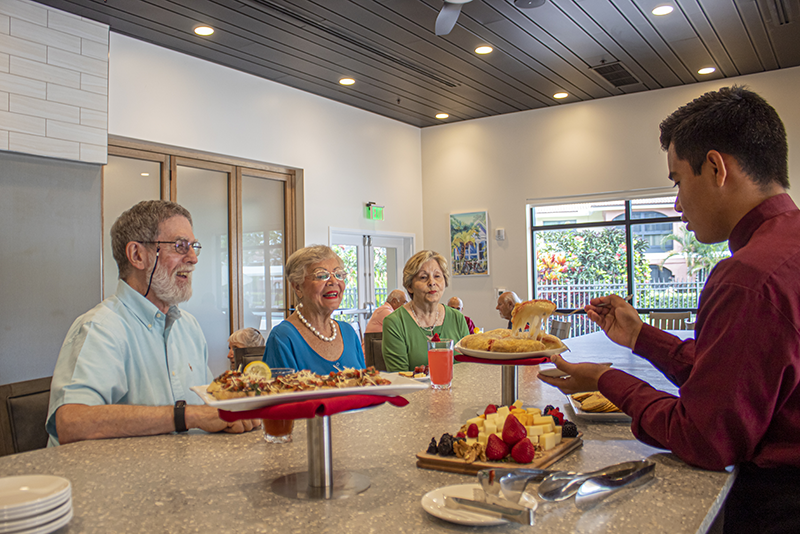What are Typical Average Monthly Retirement Expenses?

Planning for retirement isn’t just about having enough money saved, it’s about understanding how much you’ll actually spend. Retirees who take the time to estimate their monthly expenses often enjoy more financial peace of mind.
Whether you’re approaching retirement or already there and looking to make the most of your budget, let’s explore the average monthly retirement expenses and how the right living situation can help minimize them.
Estimating the Average Retirement Expenses in a Year
It’s true that retirees tend to spend less than they did during their working years—no more commuting or work-related insurance costs, for example. Still, living comfortably in retirement comes with its own set of expenses.
According to the U.S. Bureau of Labor Statistics, the average retiree household spent around $50,000 per year in 2021. While this is less than the national average of $63,000 across all households, it's still a significant amount. Here’s a breakdown of the biggest expenses in retirement.
Major Monthly Expenses in Retirement
1. Housing
Housing remains one of the largest expenses for retirees. Even if your mortgage is paid off, costs like:
- Property taxes
- Homeowner’s insurance
- Repairs and maintenance
- Utilities (electricity, water, internet, trash, landscaping)
...still add up quickly. Owning your home outright doesn’t mean living there is free—far from it. These expenses should be a top priority in your retirement budget.
2. Healthcare
Right behind housing is healthcare, which only becomes more important as we age. Medicare helps, but it doesn’t cover everything. Monthly healthcare costs may include:
- Premiums
- Prescription drugs
- Medical supplies
- Out-of-pocket costs for appointments, procedures, or therapy
And if you ever need long-term care, expenses can rise sharply. Planning for this in advance is crucial.
3. Transportation
Transportation costs typically decrease in retirement, especially if you no longer commute. But they don’t disappear. You may still need to budget for:
- Gas
- Car insurance
- Maintenance and repairs
- Registration
- Or, public transportation if you don’t drive
And don’t forget travel. With more free time, your vacation budget might actually go up in retirement.
4. Food and Entertainment
Food is a constant expense, whether you're cooking at home or dining out more often now that your schedule is open. And with more time for hobbies and outings, entertainment expenses can also increase:
- Dining out
- Movies and concerts
- Hobbies and clubs
- Cultural events or day trips
It’s smart to allocate a portion of your budget toward enjoyment. You’ve earned it!
How Retirement Communities Help Manage These Costs
Estimating your retirement expenses is step one. Managing them effectively is where the real challenge begins. While you could cut costs here and there, there’s one solution that helps manage all your expenses in one go: moving to a continuing care retirement community (CCRC).
Here’s how CCRCs help with each major expense:
1. Housing
In a CCRC, your housing costs are streamlined into a single monthly fee. That typically includes:
- Maintenance and repairs
- Landscaping and snow removal
- Utilities
- Property taxes (which disappear entirely!)
This flat-fee structure makes budgeting much easier and eliminates surprise costs like needing a new roof or furnace.

2. Healthcare
Healthcare is where CCRCs really shine. With a Type A Life Care contract, your medical costs stay stable over time even if your care needs increase. That means no financial surprises if you ever require assisted living, skilled nursing, or rehabilitation services.
You get access to a full continuum of care, all on one campus, with the peace of mind that comes from knowing your costs won’t suddenly spike. The alternative can be an increase in monthly costs of thousands of dollars for a higher level of care.
3. Transportation
Many CCRCs offer shuttle services to nearby destinations like:
- Doctor’s appointments
- Grocery stores and pharmacies
- Local attractions
This cuts down on the need for a personal vehicle, which reduces costs tied to car ownership and brings many conveniences right to your doorstep.
4. Food & Entertainment
Retirement communities also help control food and entertainment spending. On-campus dining options let you enjoy restaurant-quality meals without paying restaurant prices. Plus, CCRCs offer a wide range of built-in amenities:
- Fitness centers and pools
- Art studios and woodworking shops
- Movie nights, concerts, and community events
- Book clubs, classes, and group outings
All of this is typically included in your monthly fee, helping you stay social and active without constantly reaching for your wallet.
If you're wondering how to afford a CCRC, explore this guide for valuable insights and tips.

Retirement Planning that Works for You
Enjoying your retirement years means having the financial freedom to live the life you want—without stress or surprise bills. Estimating your monthly retirement expenses is essential, but managing them wisely is what truly allows you to thrive.
Moving to a CCRC is one of the most efficient ways to simplify your retirement finances while maximizing your quality of life. With one predictable monthly cost covering so many of your needs, retirement living becomes more affordable, more convenient, and a lot more fun.
Want to explore some of the best CCRCs in the country? Check out what Acts Retirement-Life Communities has to offer.





